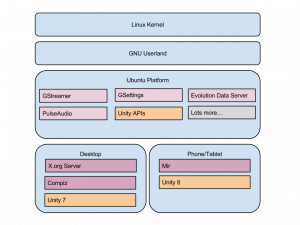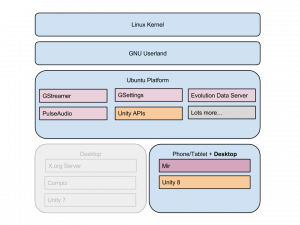There’s been a lot of talk about Ubuntu’s phone and tablet development over the last year, and it’s great that it’s getting so much attention, but people have been getting the name of it all wrong. Now, to be fair, this is a problem entirely of our own making, we started off talking about the phone (and later tablet) developments as “Ubuntu Touch”, and put most of the information about on our wiki under a page named Touch. But there is no Ubuntu Touch! It’s not a separate OS or platform, there is only one OS and it’s simply called Ubuntu.
What people are referring to when they say Touch or Ubuntu Touch, is really just Ubuntu with Unity 8. Other than the shell (and display server that powers it), it’s the same OS as you get on your desktop.
Everything under the hood is the same: same tools, same filesystem, even the same version of them, because it’s all built from the same source. Calendar data is stored in the same place, audio and video is played through the same system, even the Unity APIs are shared between desktop and phone.
So why is the name important? Not only is it more accurate to call them both Ubuntu, it’s also one of the (in my opinion) most exciting things about having an Ubuntu phone. You’re not getting a stripped down embedded Linux OS, or something so customized for phones that it’s useless on your desktop. You’re getting a fully featured, universal operating system, one that can do everything you need from a phone and everything you need from a desktop.
This is the key to Ubuntu’s convergence strategy, something that nobody else has right now. Android makes a terrible desktop OS. So does iOS. Chrome OS won’t work for a phone either, nor OSX. Even Microsoft has built two different platforms for mobile and desktop, even if they’ve slapped the same interface on both.
But with Ubuntu, once Unity 8 comes to the desktop, you will have the same OS, the same platform, on all of your devices. And while you will run the same version of Unity on both, Unity 8 is smart enough to change how it looks and how it works to meet the needs and capabilities of what you’re running it on. Better still, Unity will be able to make these changes at run time, so if you dock your convertible tablet to a keyboard, it will automatically switch from giving you a tablet interface to a desktop interface. All of your running apps keep running, but thanks to the Ubuntu SDK those too will automatically adjust to work as desktop apps.
So while “Ubuntu Touch” may have been a useful distinction in the beginning, it isn’t anymore. Instead, if you need to differentiate between desktop and mobile versions of Ubuntu, you should refer to “Unity 8″ if talking about the interface, or “Ubuntu for phones” (or tablet) if you’re talking about device images or hardware enablement. And if you’re a developer and you are talking about the platform APIs or capabilities, you’re talking about the “Ubuntu SDK”, which is already available on both desktop and mobile installs of Ubuntu.

